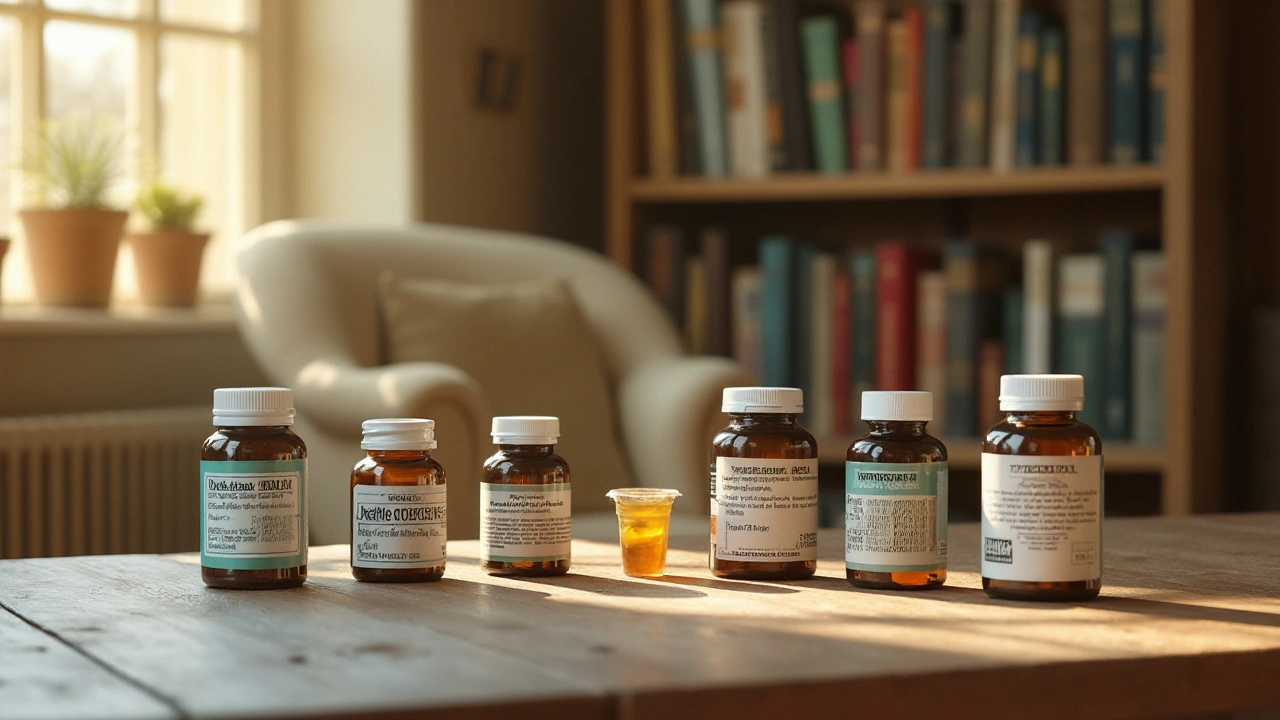Antabuse Alternatives – Safer Choices for Alcohol Dependence
If you’ve tried Antabuse (disulfiram) and felt the side effects were too harsh, you’re not alone. Many people need a medication that supports sobriety without making everyday life miserable. Below you’ll find the most common drug alternatives and practical non‑drug strategies that actually help keep drinking under control.
Prescription meds that work without the nasty reactions
Naltrexone blocks the brain’s pleasure receptors for alcohol, so a drink feels less rewarding. It comes in daily pills (Revia) or a monthly injection (Vivitrol). Most users report mild nausea at first, but it doesn’t cause the severe flushing Antabuse does.
Acamprosate helps restore the brain’s chemical balance after you stop drinking. It’s taken three times a day and is kidney‑clearance based, so no liver worries. The biggest downside is needing to stick to the schedule; missing doses can reduce its effect.
Topiramate isn’t officially approved for alcohol use, but doctors often prescribe it off‑label. It reduces cravings by dampening brain excitability. Side effects can include tingling or mild memory lapses, so start low and go slow.
Gabapentin works well for people with anxiety or sleep problems linked to drinking. A typical dose is 300‑600 mg three times a day. Watch out for dizziness; combine it with food to lessen that feeling.
Baclofen relaxes muscle tone and also cuts down on cravings. It’s cheap and easy to titrate, but some users feel weak or experience low blood pressure at higher doses.
Lifestyle and non‑drug options to boost sobriety
Medication alone isn’t a magic bullet. Pairing any of the above drugs with counseling dramatically improves success rates. Cognitive‑behavioral therapy (CBT) teaches you how to spot triggers and replace drinking with healthier habits.
Support groups like Alcoholics Anonymous or online forums give you real‑world accountability. Sharing experiences removes the isolation that often fuels relapse.
Smartphone apps now track cravings, remind you of medication times, and connect you with a sober buddy at the tap of a button. The data they collect can also show patterns you didn’t notice before.
Exercise, proper sleep, and balanced nutrition rebuild brain chemistry naturally. Even short walks after meals lower stress hormones that might otherwise push you toward a drink.
Finally, consider “med‑free” trial periods. Some people succeed by using the medication only during high‑risk months (like holidays) while relying on therapy the rest of the year.
Choosing an Antabuse alternative is personal—what works for one person might not fit another. Use this guide to talk with your doctor about side‑effect profiles, dosing convenience, and any health conditions you have. Our site also hosts deep dives into each medication, so you can read detailed pros, cons, and real‑world experiences before making a decision.
Remember: the goal isn’t just stopping drinking; it’s building a life where alcohol no longer controls your choices. With the right mix of medication and everyday tools, that life is within reach.

Best Antabuse Alternatives for 2024: Exploring Effective Options for Alcohol Use Disorder
- Oct, 31 2024
- 5
This article explores six notable alternatives to Antabuse for the treatment of alcohol use disorder in 2024. Each alternative offers different mechanisms and benefits in managing cravings and promoting abstinence. The options range from FDA-approved medications like Naltrexone and Acamprosate to natural remedies like Kudzu root extract. Whether you are considering pharmaceuticals or exploring herbal options, this guide shines a light on the pros and cons of each to help in making an informed decision.
Categories
- Health and Medicine (64)
- Health and Wellness (57)
- Medicine (37)
- Women's Health (11)
- Mental Health (10)
- Men's Health (7)
- Beauty and Wellness (4)
- Health Information (4)
Archives
- February 2026 (11)
- January 2026 (25)
- December 2025 (28)
- November 2025 (25)
- October 2025 (27)
- September 2025 (14)
- August 2025 (3)
- July 2025 (2)
- June 2025 (2)
- May 2025 (3)
- April 2025 (4)
- March 2025 (4)
- online pharmacy
- medication safety
- dietary supplement
- health benefits
- dietary supplements
- generic drugs
- prevention
- fertility
- online pharmacy Australia
- side effects
- QT prolongation
- medication side effects
- diabetes medications
- GLP-1 agonists
- nocebo effect
- brand vs generic
- treatment
- treatment options
- benefits
- connection
